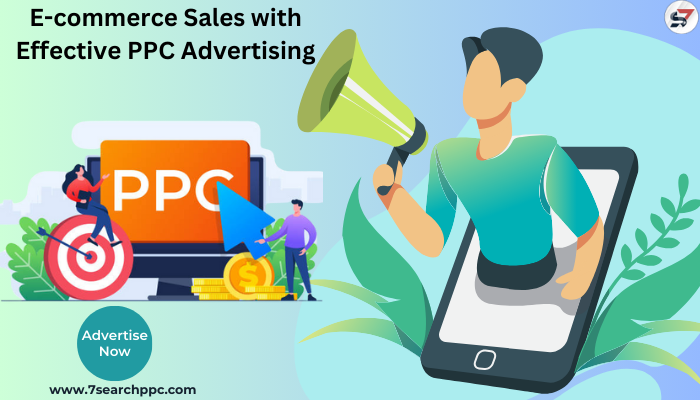How to use PPC advertising to increase your e-commerce sales and conversions?
-
PPC advertising, or pay-per-click advertising, is a form of online marketing where advertisers pay a fee each time someone clicks on their ads. PPC advertising can help [url=https://www.7searchppc.com/ecommerce-advertising-ads-network][b]e-commerce businesses[/b][/url] increase their sales and conversions by:

[][b] Driving targeted traffic to their website or landing page.[/b] PPC advertising allows e-commerce businesses to reach potential customers who are searching for their products or services on search engines or browsing related websites. PPC advertising can also help e-commerce businesses target specific audiences based on their location, demographics, interests, behavior, and more.
[][b] Increasing brand awareness and visibility.[/b] PPC advertising can help e-commerce businesses build their brand recognition and reputation by appearing on prominent platforms such as Google, Facebook, Instagram, YouTube, and more. PPC advertising can also help e-commerce businesses showcase their unique selling proposition, value proposition, and social proof through their ad copy, images, videos, and reviews.
[][b] Generating leads and sales.[/b] PPC advertising can help e-commerce businesses convert their website visitors into leads and customers by creating compelling and relevant offers, calls to action, and landing pages. PPC advertising can also help e-commerce businesses track and measure their conversion rates, cost per acquisition, return on ad spend, and other key performance indicators.
[/list]
To use PPC advertising effectively to increase e-commerce sales and conversions, e-commerce businesses need to:
[list]
[][b] Conduct keyword research and competitor analysis. [/b]E-commerce businesses need to identify the most relevant and profitable keywords for their products or services, as well as analyze their competitors' PPC strategies, strengths, and weaknesses.
[][b] Create and optimize their PPC campaigns and ad groups.[/b] E-commerce businesses need to set up and manage their PPC campaigns and ad groups according to their goals, budget, and target audience. E-commerce businesses need to choose the right platforms, networks, formats, and bidding strategies for their PPC ads, as well as write catchy and persuasive ad copy, headlines, and descriptions.
[][b] Design and test their landing pages.[/b] E-commerce businesses need to create and optimize their landing pages to match their PPC ads and offer a seamless and satisfying user experience. E-commerce businesses need to ensure that their landing pages are fast, mobile-friendly, easy to navigate, and clear on what they want the visitors to do. E-commerce businesses also need to test and experiment with different elements of their landing pages, such as headlines, images, videos, forms, buttons, and more, to find out what works best for their conversions.
[/list]
[b]• Monitor and improve their PPC performance.[/b] E-commerce businesses need to track and analyze their PPC results and metrics, such as impressions, clicks, conversions, cost per click, quality score, and more, to evaluate their PPC effectiveness and efficiency. E-commerce businesses also need to use tools and techniques such as Google Analytics, Google Tag Manager, Google Optimize, and A/B testing, to gain insights and optimize their PPC campaigns and landing pages.